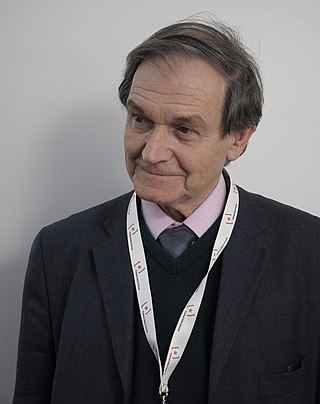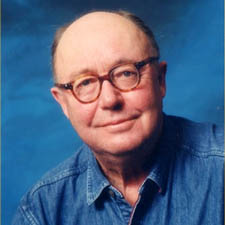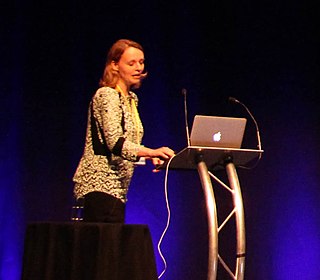Related Research Articles

Sir Roger Penrose is a British mathematician, mathematical physicist, philosopher of science and Nobel Laureate in Physics. He is Emeritus Rouse Ball Professor of Mathematics in the University of Oxford, an emeritus fellow of Wadham College, Oxford, and an honorary fellow of St John's College, Cambridge, and University College London.
Martín Abadi is an Argentine computer scientist, working at Google as of 2024. He earned his Doctor of Philosophy (PhD) in computer science from Stanford University in 1987 as a student of Zohar Manna.

Jane Elizabeth Hillston is a British computer scientist who is professor of quantitative modelling and former head of school in the School of Informatics, University of Edinburgh, Scotland.

Karen Ida Boalth Spärck Jones was a self-taught programmer and a pioneering British computer scientist responsible for the concept of inverse document frequency (IDF), a technology that underlies most modern search engines. She was an advocate for women in computer science, her slogan being, "Computing is too important to be left to men." In 2019, The New York Times published her belated obituary in its series Overlooked, calling her "a pioneer of computer science for work combining statistics and linguistics, and an advocate for women in the field." From 2008, to recognize her achievements in the fields of information retrieval (IR) and natural language processing (NLP), the Karen Spärck Jones Award is awarded annually to a recipient for outstanding research in one or both of her fields.

Roger Michael Needham was a British computer scientist.
Dexter Campbell Kozen is an American theoretical computer scientist. He is Professor Emeritus and Joseph Newton Pew, Jr. Professor in Engineering at Cornell University.

Mark James Handley is Professor of Networked Systems in the Department of Computer Science of University College London since 2003, where he leads the Networks Research Group.

Susan Elizabeth Black is a British computer scientist, academic and social entrepreneur. She is known for saving Bletchley Park, with her Saving Bletchley Park campaign. Since 2018, she has been Professor of Computer Science and Technology Evangelist at Durham University. She was previously based at the University of Westminster and University College London.

Wenfei Fan is a Chinese-British computer scientist and professor of web data management at the University of Edinburgh. His research investigates database theory and database systems.
Katherine Elizabeth Jones is a British biodiversity scientist, with a special interest in bats. She is Professor of Ecology and Biodiversity, and Director of the Biodiversity Modelling Research Group, at University College London. She is a past chair of the Bat Conservation Trust.

Maja Pantić is a Professor of Affective and Behavioural Computing at Imperial College London and an AI Scientific Research Lead in Facebook London. She was previously Professor of Affective and Behavioural Computing University of Twente and Research Director of the Samsung AI lab in Cambridge, UK. She is an expert in machine understanding of human behaviour including vision-based detection and tracking of human behavioural cues like facial expressions and body gestures, and multimodal analysis of human behaviours like laughter, social signals and affective states.

Hiranya Vajramani Peiris is a British astrophysicist at the University of Cambridge, where she holds the Professorship of Astrophysics (1909). She is best known for her work on the cosmic microwave background radiation, and interdisciplinary links between cosmology and high-energy physics. She was one of 27 scientists who received the Breakthrough Prize in Fundamental Physics in 2018 for their "detailed maps of the early universe".

Joanna Dunkley is a British astrophysicist and Professor of Physics at Princeton University. She works on the origin of the Universe and the Cosmic microwave background (CMB) using the Atacama Cosmology Telescope, the Simons Observatory and the Large Synoptic Survey Telescope (LSST).
Claire Sandrine Jacqueline Adjiman is a professor of Chemical Engineering at the Department of Chemical Engineering at Imperial College London and a Fellow of the Royal Academy of Engineering.

This is a timeline of women in science, spanning from ancient history up to the 21st century. While the timeline primarily focuses on women involved with natural sciences such as astronomy, biology, chemistry and physics, it also includes women from the social sciences and the formal sciences, as well as notable science educators and medical scientists. The chronological events listed in the timeline relate to both scientific achievements and gender equality within the sciences.
The Roger Needham award is a prize given scientists who are recognised for important contributions made to computer science research The British Computer Society established an annual Roger Needham Award in honour of Roger Needham in 2004. It is a £5000 prize is presented to an individual for making "a distinguished research contribution in computer science by a UK-based researcher within ten years of their PhD." The award is funded by Microsoft Research. The winner of the prize has an opportunity to give a public lecture.
Alexandra Jane Shepard is Professor of Gender History at the University of Glasgow. In 2018 Shepard was elected a Fellow of the British Academy in recognition for her work in gender history and the social history of early modern Britain. In 2019 she was elected a Fellow of the Royal Society of Edinburgh.

Kristin Alexandra Andrews is Professor in the Department of Philosophy at York University and she holds the York Research Chair in Animal Minds.
The Suffrage Science award is a prize for women in science, engineering and computing founded in 2011, on the 100th anniversary of International Women's Day by the MRC London Institute of Medical Sciences (LMS). There are three categories of award:
- life sciences
- engineering and physical sciences
- mathematics and computing.
Jade Alglave is a French computer scientist whose research involves concurrency control, consistency models, weak hardware memory models, the relation between computer hardware and programming languages, and the "cat" domain-specific language for consistency models. She is a professor of computer science at University College London and a distinguished engineer at British semiconductor firm Arm.
References
- ↑ Silva, Alexandra (2010). Kleene coalgebra (PDF). ru.nl (PhD thesis). 694079062. hdl:2066/83205. OCLC 694079062.

- 1 2 Alexandra Silva publications indexed by Google Scholar
- ↑ Silva, Alexandra (2017). "Alexandra Silva CV" (PDF). alexandrasilva.org. Archived from the original (PDF) on 2017-10-03.
- ↑ "Alexandra Silva". www.cs.ucl.ac.uk. 2018-08-20.
- ↑ "Dr Alex Silva awarded prestigious Leverhulme Trust Award". Computer Science News. University College London. 28 October 2016. Retrieved 2019-09-04.
- ↑ Anon (2018). "Computer Science News: Alexandra Silva Receives BCS Roger Needham Award 2018" . Retrieved 2018-08-30.